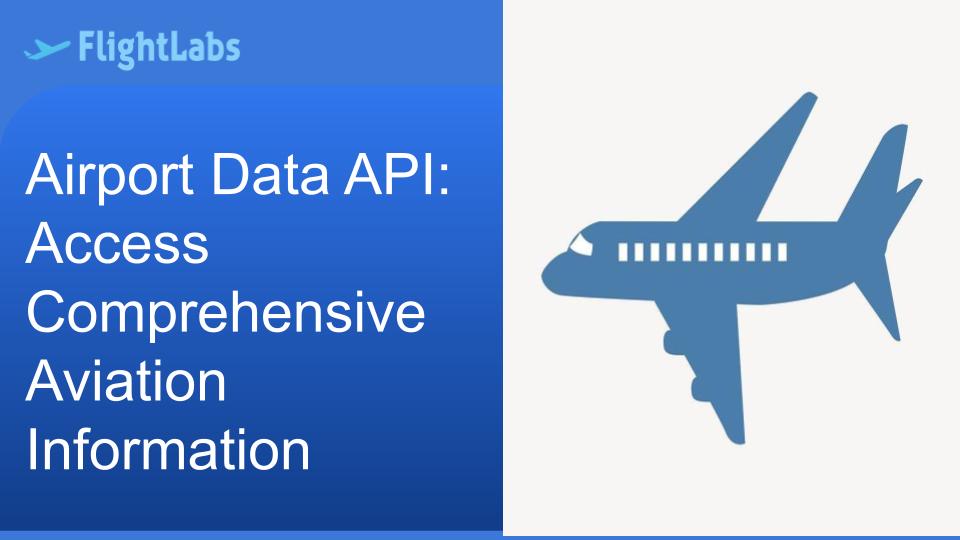Airport Data API: Access Comprehensive Aviation Information

The aviation industry relies on accurate and comprehensive data to ensure smooth operations, enhance passenger experiences, and facilitate effective decision-making. Airport Data APIs have become essential tools for accessing a wide range of aviation information, including airport facilities, services, flight schedules, and more. In this blog post, we'll explore the benefits of using an Airport Data API and how it enables users to access comprehensive aviation information.
Airport Facilities and Services:
One of the key features of an Airport Data API is its ability to provide detailed information about airport facilities and services. Users can access data on terminals, gates, lounges, restaurants, shops, parking options, ground transportation, and more. This information is valuable for passengers planning their journeys, airport personnel managing operations, and travel businesses providing services to customers.
Flight Schedules and Status:
Airport Data APIs offer access to comprehensive flight schedules and real-time flight status updates. Users can retrieve information about arrivals, departures, delays, cancellations, gate assignments, baggage claims, and more. This real-time data is crucial for airlines, passengers, and airport staff to stay informed about flight operations and make timely decisions.

Get Started With FlightLabs And Its Beneficts
Another benefit of using an FlightLabsis access to weather forecasts and air traffic conditions. Users can retrieve weather information for airports, including temperature, wind speed, precipitation, and visibility. Additionally, air traffic data provides insights into airspace congestion, flight routes, and potential delays. This information helps users plan their journeys and anticipate potential disruptions.
Ground Transportation Options:
FlightLabs includes data on ground transportation options, such as taxis, shuttles, rental cars, public transit, and rideshare services. Users can access information about transportation providers, routes, schedules, fares, and booking options. This data enables passengers to plan their airport transfers efficiently and choose the most convenient transportation mode.
Customizable Widgets and Integrations:
FlightLabs offers customizable widgets and integrations that users can incorporate into their applications and websites. These widgets display relevant airport information, flight status updates, weather conditions, and ground transportation options. Integrations with booking platforms, travel apps, and navigation systems enhance the overall user experience and provide value-added services to customers.
Security and Regulatory Compliance:
FlightLabs adheres to security standards and regulatory requirements to ensure the protection of sensitive information. They implement encryption protocols, authentication mechanisms, and data privacy measures to safeguard user data and maintain compliance with industry regulations. Users can trust that their data is secure when using an Airport Data API for accessing aviation information.
Global Coverage and Data Accuracy:
FlightLabs offers global coverage, providing information about airports worldwide. They aggregate data from multiple sources, including airports, airlines, weather services, and air traffic control systems, to ensure comprehensive and accurate information. Users can access up-to-date and reliable data for airports across different regions and countries.
Enhanced Decision-Making and Efficiency:
By leveraging an FlightLabs, users can make informed decisions and improve operational efficiency. Airlines can optimize flight schedules, allocate resources effectively, and enhance customer service based on real-time data. Passengers can plan their trips, navigate airports seamlessly, and stay updated with flight information, leading to a smoother travel experience overall.

Conclusion:
In conclusion, an FlightLabs provides users with access to comprehensive aviation information, including airport facilities, flight schedules, weather conditions, ground transportation options, and more. Its customizable widgets, real-time updates, global coverage, data accuracy, security features, and integration capabilities empower users to make informed decisions, enhance operational efficiency, and improve the overall travel experience. Embracing an Airport Data API is essential for staying competitive, meeting customer expectations, and driving innovation in the aviation industry.